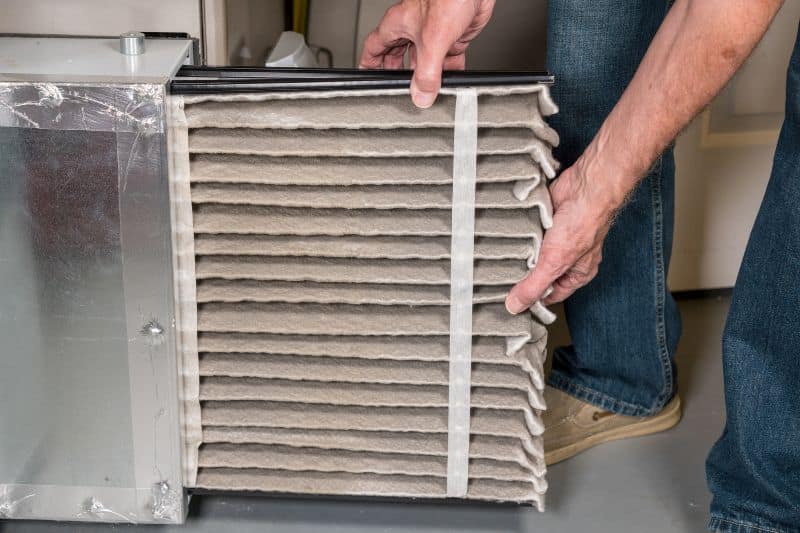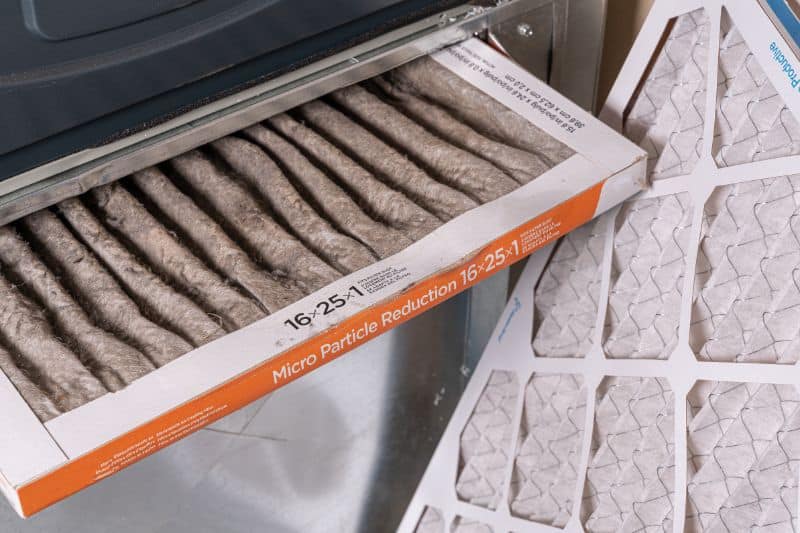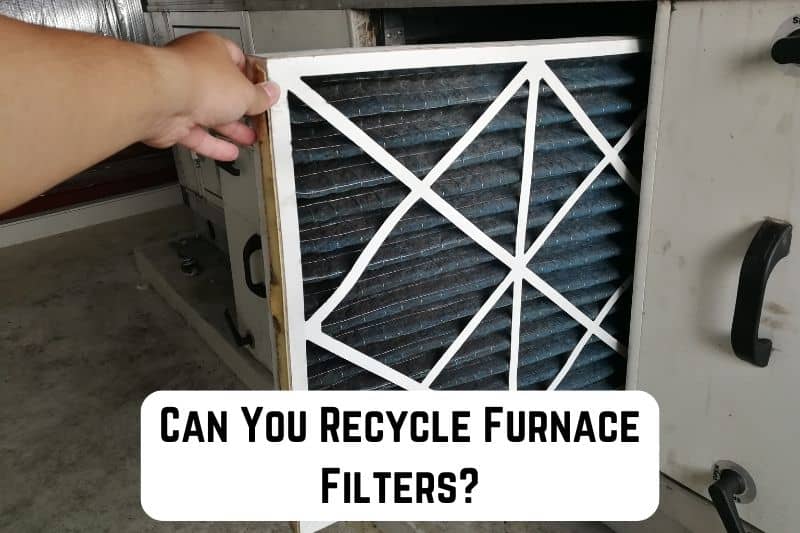Furnace filter recycling is an issue that touches on both responsible waste management and environmental awareness. Furnace filters are essential for preserving the air quality within buildings because they collect dust, dirt, and other particles. To maintain the heating or cooling system’s performance over time, these filters get clogged and must be replaced.
But what happens with the old furnace filters? Do you dump them or send them to the recycling facility near your home? Well, this is what we are going to look at in this article and see if you can recycle furnace filters.
Read: 13 Uncommon Reasons Why Tiny Homes are a Bad Idea
Basics of Furnace Filters
Furnace blower fan filters shield the fans from most of the debris your furnace draws into them, preventing blockage. The furnace filter effectively accomplishes this by capturing dirt particles and stopping them from spreading throughout your house.
Nevertheless, the life and functionality of your furnace will depend on the type of filter you select. A furnace is an air handler with a fire inside. The air handler is where indoor air is conditioned and circulated throughout the house through supply vents after being drawn in through return vents and ductwork.
The air filter is positioned between the air handler assembly and the return air duct to collect airborne particles. Fine threads twisted together to block and capture airborne particles comprise household air filters. The fast-moving particles smash and become lodged in the air filter threads due to inertia, just like a car might eventually careen off a curved road.
When selecting a filter, please consider its total cost, intended use for contingent elements like allergies or pets, size, minimum efficiency reporting value (MERV) rating, and the manufacturer’s recommendations for your furnace.
Every filter type has a varied short- and long-term cost associated with it and varying performance. To find out which would be most compatible with your heating, ventilation, and air conditioning (HVAC) system, call our experts at Arizona Comfort Systems.
Can You Recycle Furnace Filters?
Furnace filters can be recycled in most cases, yet some might include non-recyclable materials like fiberglass and polyester. However, recyclable materials, including paper, cardboard, plastic, and metal, make up the majority of furnace filters. It is best to investigate the product and look for recycling instructions on the packaging to determine if a filter is recyclable.
That being said, there is still potential for lessening the adverse environmental effects of furnace filters. Although there may be few possibilities for recycling conventional furnace filters, proper disposal is essential.
Seek waste management organizations that take non-recyclable materials instead of throwing used filters in the usual trash. Certain facilities might have specific procedures to handle and manage such trash in an environmentally responsible way.
It makes sense for people dedicated to living more sustainably to look into eco-friendly substitutes for conventional furnace filters. Several manufacturers currently produce filters consisting of recycled or biodegradable materials. With their environmentally friendly design, these filters seek to reduce the environmental impact of HVAC maintenance.
Reusable and washable filters are another fresh approach that is becoming increasingly well-liked. These filters can be cleaned and reused several times because they are often composed of sturdy materials like polyester or stainless steel.
Homeowners who care about the environment may require a larger initial expenditure, but over time, they will save money and provide long-term environmental advantages. Investigate do-it-yourself upcycling methods to get creative with recycled furnace filters.
The filter material might not be recyclable in conventional facilities, although it might be repurposed for craft projects. Think about reusing the filter material for artistic endeavors like making textured canvases or one-of-a-kind home décor pieces. Taking up such creative pursuits lessens waste and gives your living area a unique touch.

Environmental Impact of Furnace Filters
Furnace filter environmental impact is an essential factor to consider as more and more homes try to embrace more sustainable practices. When thinking about how furnace filters affect the environment, keep the following points in mind:
Manufacturing Materials
Conventional furnace filters are usually constructed from a blend of materials like metal, paper, and fiberglass. Materials extraction and processing add to resource depletion, energy use, and carbon emissions.
Use of Energy and Resources
Transportation, energy-intensive manufacturing procedures, and raw material extraction are necessary to produce disposable furnace filters. This is part of the total carbon footprint that these filters have.
Non-Biodegradable Components
Metal frames and synthetic fibers are two examples of non-biodegradable materials in many furnace filters. These filters may take a long time to break down in landfills, which adds to environmental pollution.
Waste Generation
Waste from disposable filters is produced in large quantities. Frequent replacements create a never-ending supply of used filters, increasing the total amount of waste homes produce. Environmental problems can worsen when filters are disposed of improperly, such as by dumping them in regular trash.
Landfill Impact
The materials furnace filters are made of have the potential to leak dangerous compounds or contaminate soil and water when they end up in landfills. Disposable filter accumulation in landfills can have a negative environmental impact.
Transportation Impact
Furnace filter movement from producers to distributors and ultimately to customers adds to the product’s environmental impact. Transportation-related carbon emissions can be reduced by considering local or regional production and distribution.
Challenges in Recycling Furnace Filters
Several obstacles are involved since furnace filters are made of various materials and require specific recycling procedures. The following are some significant obstacles to furnace filter recycling.
Material Complexity
Various materials, such as fiberglass, paper, metal, and synthetic fibers, are frequently used to make furnace filters. It isn’t easy to create a single recycling procedure that efficiently separates and recycles all the parts because of the combination of various elements.
Lack of Standardization
Creating a recycling procedure that works for all furnace filters is challenging due to the need for uniform materials and designs. Since every manufacturer may utilize a different combination of components, creating a recycling system that works for everyone is difficult.
Contamination Risk
Dust, debris, and other pollutants accumulated over time may be present in furnace filters. Because of this contamination, the recycling process is more difficult because careful cleaning and separation are needed to guarantee that the recovered materials satisfy quality standards.
Limited Infrastructure
One major issue is whether recycling furnace filters is cost-effective. It could not be easy to establish and run specialist recycling facilities for these filters, mainly if there isn’t much of a market for recycled components.
Public Awareness
Many customers may be unaware of the necessity of appropriate disposal or that furnace filters can be recycled. Ignorance can result in inappropriate disposal methods, impeding recycling attempts.
Low Market Demand
There might be less market demand for recovered furnace filter materials. There may be less financial motivation to invest in recycling infrastructure if there is a lack of demand for recycled products.
Safety Concerns
Some furnace filters could include components that, when recycled, could be dangerous. For instance, Filters containing metal parts must be handled carefully to prevent accidents or damage to the equipment.

Alternatives to Disposal of Furnace Filters
Regarding furnace filters, considering disposal options can help create a more environmentally responsible and sustainable strategy. The following are a few substitutes for customary disposal techniques.
Programs for Recycling
Look at recycling initiatives and furnace filter acceptance facilities. Certain specialist recycling facilities might have procedures for dealing with the particular materials found in filters. To learn more about specific recycling possibilities, contact your area’s recycling facilities or waste management authority.
Read: How To Dispose of Fireplace Ashes Sustainably?
Programs for Manufacturer Take-Backs
Verify whether the company that makes your furnace filters has a take-back scheme. Certain manufacturers have recycling programs that accept used filters back for recycling or appropriate disposal. This may be an easy and responsible approach to guarantee that the filters are handled with consideration for the environment.
Reusing and Repurposing
Examine inventive methods for reusing or recycling furnace filters. The filter material can be used for do-it-yourself applications even though it might not be appropriate for conventional recycling. Consider incorporating the material into creative projects, artwork, or home décor.
Give to Non-Critical Purposes
Give the filters to people or organizations that can utilize them for non-essential uses if they are still in reasonably good shape. Local community centers, art studios, or schools might develop inventive methods to use the filters in their work.
FAQ’s
What materials are furnace filters made of?
Fiberglass, metal, paper, and synthetic fibers are commonly used to make furnace filters. The particular makeup may differ according to the kind and manufacturer of the filter.
Can I compost my furnace filters?
Your furnace filters might be appropriate for composting if they are composed of biodegradable materials, like cardboard filters. Please make sure they’re clean before putting them in a composting environment.
How often should furnace filters be replaced?
Air quality, usage, and filter type are some variables that affect how frequently furnace filters need to be changed. Washable filters may be cleaned and reused longer than disposable filters, which need to be changed every one to three months.
Conclusion
Fortunately, recycling doesn’t have to be as difficult as replacing or removing your furnace filter. Understanding how recycling functions and efficiently lowers trash accumulation, global warming, and pollution has been made simpler by researchers and recycling specialists. Anyone can recycle used materials like furnace filters, metal, plastic, and textiles to support the environmental movement.
You may quickly and effectively sort all the recyclable material from what is not recyclable and recycle or discard the remaining stuff using the recycling filter tips and tricks.






